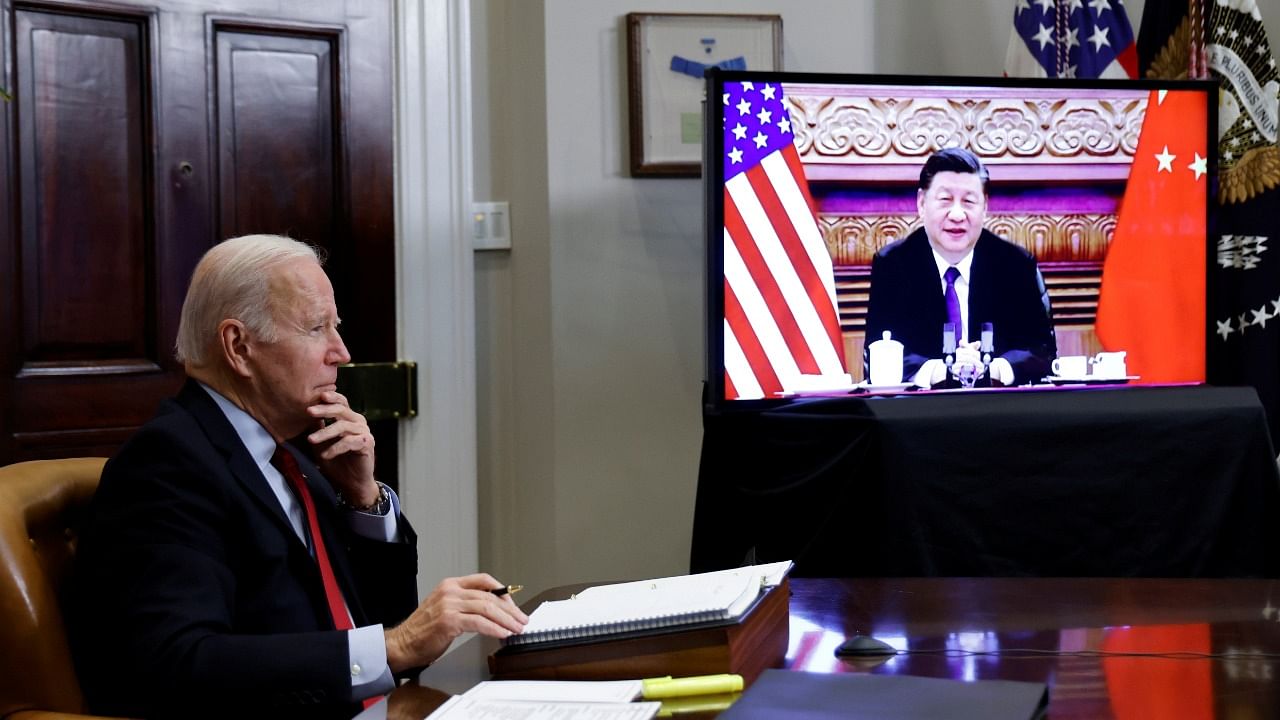
US President Joe Biden took the initiative for a virtual summit with China after concerns at the escalating tensions between the two countries over Taiwan and China's accelerating build-up of nuclear warheads. As the Chinese President Xi Jinping has concentrated all powers in himself, Biden felt that it had become necessary to discuss these concerns at the highest level.
Given Xi's sensitivities about "mutual respect" (enhanced and equal status for China), the US trying to change China's political system and calling the US-led alliances as "Cold War thinking", Biden told him that the US "does not seek to change China's system, the revitalisation of its alliances is not anti-China, and it has no intention to have a conflict with China."
The most important issue on the agenda was Taiwan. Biden emphasised that while the US was committed to the 'one China' policy, it strongly opposed unilateral efforts (by China) to change the status quo or undermine peace and stability across the Taiwan Strait. Xi said that China was "patient and sought peaceful unification with sincerity"; if the separatist forces in Taiwan provoked China or broke its red lines (seeking independence) China would take "drastic measures".
Also Read | Why is Taiwan crucial for the two superpowers?
Another concern to the US was the build-up in China's nuclear arsenal, its hypersonic missile tests, progress in space and cyber technologies and managing strategic risks so that the "competition does not veer into conflict". China underscored that its nuclear arsenal was at a much lower level. Any formal talks on this subject would be linked to the US cooperation in resolving the Taiwan issue and "ceasing off its hostile actions". The two leaders agreed to continue discussing this subject in an informal dialogue (track two). It is a positive considering that China had never agreed earlier to participate in nuclear arms control talks.
In the run-up to the summit, there was some progress on climate change when the two countries issued a joint declaration affirming cooperation on cutting methane emissions, protecting forests, increasing the use of renewable energy, accelerating low carbon transition and technological innovation. They agreed to ease restrictions on the travel and visas of journalists and continue discussions on the regional challenges like DPRK, Afghanistan and Iran, enhancing energy supplies, trade and other issues in working groups.
As expected, the two leaders disagreed on human rights, Hong Kong, Xinjiang, Tibet and other issues with the Chinese president stating that these pertained to China's territorial integrity and "core interests".
The summit produced only modest results, and no agreements or breakthroughs were expected in any case. Both sides are happy at the conciliatory tone at the summit and mutual desire to prevent further deterioration of their relationship. There are significant differences between the two countries in their approach to the bilateral relationship. President Biden believes that while continuing their competition, the US and China should responsibly manage their relationship by avoiding conflict.
President Xi thinks that the two countries should work together for "win-win cooperation" - meaning that Washington should be more forthcoming in accommodating China's interests. After this summit, Beijing has lowered its opposition to "competition" and its Deputy Foreign Minister Xie Feng said that while cooperation was still China's priority, both countries could be engaged in competition in the economic field.
Chinese officials have said that Xi had the upper hand as President Biden initiated the summit, and the meeting continued until midnight Washington time. Biden's calling of Xi as a major world leader was music to his ears. The Chinese could now say with some pride that the time for the US to unilaterally define its ties with Beijing had passed, and the two countries now have "equal and fair dialogue".
Will this summit result in the establishment of any durable détente between the two countries? It is unlikely as the underlying problems between the two countries are yet to be resolved. Xi would continue his aggressive policies towards America's allies and partners, and the latter would expect the US to provide political and military support. This was vividly demonstrated last week when a Chinese coastguard ship fired a water cannon at a boat of the Philippines delivering supplies to their marines in the Spratly Islands, which provoked a warning by the US that they would come to the Philippines's defence in the event of a war.
Another case in point is the call for a diplomatic boycott of the Beijing Winter Olympics scheduled for February 2022 by the US, the UK and other countries. On Taiwan itself, the US has announced that the second round of its economic prosperity and partnership dialogue would begin from November 22. China has termed this a betrayal of Biden's "pledges" and called on the US government to stop all official exchanges with Taiwan.
Many China watchers believe that peace with Xi will at best be tactical as he is determined to pursue his grand ambition of seeking global supremacy. The only way to contain Xi's aggression is for the US, its allies, and partners to further strengthen unity and push back his belligerent and hegemonic policies by supporting Taiwan and other affected states.
(The writer is a former Ambassador)
Disclaimer: The views expressed above are the author's own. They do not necessarily reflect the views of DH.
Deccan Herald is on WhatsApp Channels| Join now for Breaking News & Editor's Picks